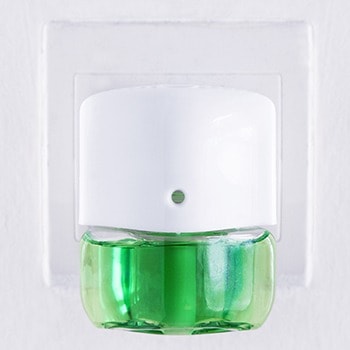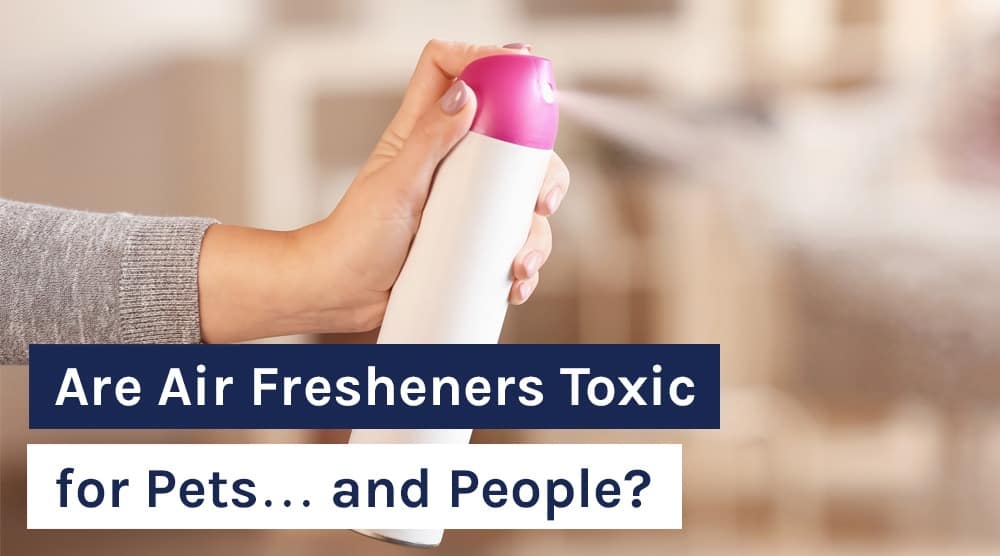Are Air Fresheners Toxic for Pets… and People?
In a hurry? Click here to read the Article Summary...
If you have pets in your home, chances are the air doesn’t always smell as “fresh” or “pretty” as you like it. This idea is reinforced when we see TV advertisements of home owners gleefully spraying air freshener on and around couches, dog beds, and cat litter boxes. Or happily plugging air fresheners into wall sockets. But if you want your pets to stay healthy and toxin-free, they need to stay away from commercial air fresheners at all costs… and you should too!
The fragrance molecules that make up chemical plug-in air fresheners like the popular brands sold in grocery stores are called volatile organic compounds (VOCs). The chemicals used in these products are anything but organic, however.
Fortunately, there are some natural, non-toxic alternatives that you can use without the risk of sending Fido or Fifi to the vet. With some knowledge and a little caution, you can have a fresh-smelling home and healthy pets too!
Why Are Air Fresheners Toxic?
 If you are a parent, then you probably recall all the precautions you took to keep harmful chemical substances away from your baby and toddler. Pet parents have that same responsibility. The big difference, however, is that keeping your fur babies protected from harm lasts a lifetime!
If you are a parent, then you probably recall all the precautions you took to keep harmful chemical substances away from your baby and toddler. Pet parents have that same responsibility. The big difference, however, is that keeping your fur babies protected from harm lasts a lifetime!
These precautions are especially important when it comes to commercial air fresheners, scented candles, and potpourris – all of which contain some of the most hazardous chemicals out there today.
Amongst the hundreds of fragrance-related chemicals that are either known carcinogens or have yet to even be tested for their safety, here are three of the most common:
#1 – Benzene. Benzene is one of the most abundant chemicals found in fragrance products. It is derived from petroleum and has been linked to cancer, especially leukemia [1].
#2 – Formaldehyde. Formaldehyde is another scent chemical with associations to respiratory issues, nasal cancer, and leukemia [2]. Despite its use in air fresheners and other “smelly” products, it is often odorless and colorless.
#3 – Phthalates. Next on the list are the many categories of “phthalates.” These include Di-n-butyl Phthalate (DBP), Diethyl Phthalate (DEP), Dimethyl Phthalate (DMP), Diisobutyl Phthalate (DIBP), Dimethyl Phthalate (DMP) and Diisohexyl Phthalate (DIHP). All of these substances can cause reproductive changes, hormone imbalance and, in some cases, cancer. Di-n-butyl Phthalate (DBP) is recognized by the National Toxicology Program and by the state of California as a ”reproductive toxicant [3].”
What About Using an Air Purifier Along With Air Fresheners?
Some pet parents (and people parents) may think that commercial air fresheners are safe as long as they are used in conjunction with an air purifier. This is not the case, however.
A University of California-Berkeley study found that using an air freshener in a room along with an ozone-producing air purifier still resulted in formaldehyde levels that were 25% higher than California state recommendations [4].
Essential Oil Diffusers and Pets
 One viable alternative to harsh chemical air fresheners is essential oil diffusers and using organic essential oils. Keep in mind, however, that your furry family members have more sensitive bodies – and especially more sensitive sniffers – than you do!
One viable alternative to harsh chemical air fresheners is essential oil diffusers and using organic essential oils. Keep in mind, however, that your furry family members have more sensitive bodies – and especially more sensitive sniffers – than you do!
Take precautions by following these 5 “Essential” tips:
#1 – Take it slow with new scents.
Your pet’s sense of smell is their most valuable, and precious, asset. A dog’s sniffer is 100,000 times more powerful than a human’s [5]!
A cat’s sense of smell is a little bit less acute, but still very strong. This means that your pets are super sensitive to every little smell that may be lingering in your home. Take it slow when introducing a new diffuser oil. A good way to do this is to wear the essential oil on yourself first and see how your pet reacts.
#2 – Choose the right kind of diffuser.
Passive diffusers evaporate essential oils, sometimes in a carrier oil or soy candle, to produce a pleasant fragrance. Active essential oil diffusers such as nebulizers and ultrasonic diffusers use pressure to create fragrant droplets that float in the air.
If you have an allergy-prone pet, you may consider sticking to a passive diffuser. As a side note, most veterinary experts do not recommend diffuser use around birds.
#3 – Choose a safe place to put your diffuser.
As you know, your pets are curious creatures. Anything new within close vicinity may be a target for batting, chewing, or extra sniffing. Ideally, you want to put your diffuser in a room that is not usually occupied by your pet.
This can be a tall order if you have an active animal in your home, however. At the very least, make sure your diffuser is located in an area of your home where your dog or cat cannot access it easily.
#4 – Check for reactions.
After you introduce a diffuser in a room and for a little bit afterwards, take note of any unusual behavior or side effects. Sneezing, coughing, vomiting, and lethargy may be telltale signs that something is not right. If this happens, immediately remove your pet from the area. Ideally, take him or her outside to get some fresh air. If side effects continue or get worse, contact your veterinarian right away.
#5 – Keep essential oil diffusers away from cats.
Cats have more restrictions than dogs when it comes to essential oils. While opinions differ on the subject even amongst experts (some say peppermint oil can be handled in small amounts as can cedarwood, rosemary, and lemongrass), there are some experts who caution against using a diffuser around cats at all [6].
This is because cats have thin skin, they lick their coats for cleanliness, and their livers are more sensitive than other animals.
For sure, citrus oils like lemon and orange as well as oils that contain polyphenolic compounds, such as cinnamon and oregano, should be kept away from cats at all costs [7]. Also note that both dogs and cats may have ill effects when exposed to too much tea tree (aka melaleuca) oil [8].
Lavender Essential Oil: Safe and Beneficial for Dogs
One essential oil that appears to be safe and even beneficial for dogs when used in moderation is lavender [9]. Lavender contains linalool and linalyl acetate, the terpenes most responsible for calming the nervous systems of mammals.
In fact, 100% organic, sustainably-sourced lavender essential oil may be a great scent for both you and your dog. Many of us are prone to minor anxiety or nervousness throughout the day, or simply need a wind-down scent in the evening. This calming herb is also considered to have anti-inflammatory and anti-bacterial properties for both you and your dog.
Just like with any oils, however, be sure to proceed with caution and make sure your pet does not have a sensitivity to this otherwise gentle and very calming oil.
Beware of So-Called “Green” Air Fresheners
You may have seen air freshening products that are labeled “unscented,” “all natural,” or “green.” This can be misleading, however. Many of these “natural” products also contain some of the same chemicals as regular ones. This is especially true of phthalates.
The Natural Resources Defense Council completed a comprehensive review of common household air fresheners in 2007. They found that 12 out of 14 of the most popular brands contained harmful phthalates, including many labeled in some way as “natural [10].”
The best course of action when it comes to freshening your home is to keep it clean, vacuumed, scrubbed, and exposed to fresh outdoor air as much as possible. Using ingredients such as vinegar, baking soda, and lemon to clean is also a healthy idea for all family members.
If you use organic essential oils, proceed with caution when it comes to the safety and health of your pet friends. Be sure to keep diffusers away from cats and birds, and always give your canine companion the option of leaving the room if they react to or simply do not like the smell.
And remember: do your best to never expose them (or you) to the dangerous chemicals found in commercial air fresheners in your home or vehicle!
The powerhouse trio of herbs in Magi-Complexx provides the strongest, most synergistic healing effect, helping sufferers of arthritis pain, constant muscle aches and pains, neuropathy, systemic inflammation, slowed wound healing, circulatory challenges, as well as skin irritations like eczema, psoriasis, and acne.

 Sources:
Sources:
Article Summary
Keep your pets healthy and toxin-free by keeping them away from commercial air fresheners.
Watch out for these 3 probable carcinogens in fragrances:
- Benzene
- Formaldehyde
- Phthalates
An alternative to harsh chemical air fresheners is diffusers, using 100% organic essential oils.
Take these precautions when diffusing around animals:
- Take it slow with new scents
- Choose the right kind of diffuser
- Choose a safe place to put your diffuser
- Check for reactions
- Keep essential oil diffusers away from cats
Lavender oil appears to be safe and even beneficial for dogs.
Air freshening products that are labeled “unscented,” “all natural,” or “green” can be misleading.




Please explain HOW scented wood wick candles can be harmful to my pets or myself...
Thank you
Many of them contain harmful chemicals (such as those listed in this article) and other chemicals as well. These are released into the air and you and your pets breathe them in, from there they go into your bloodstream. Not all candles are harmful, you just have to be careful not to buy Yankee (and other brand name) candles or cheap commercially sold candles. I would recommend some locally made beeswax or non-GMO soy candles that have the ingredients listed on the jar! Check out Etsy, I bet they have a great selection of homemade non-toxic candles! This way you can support a small business or local artisan at the same time :D